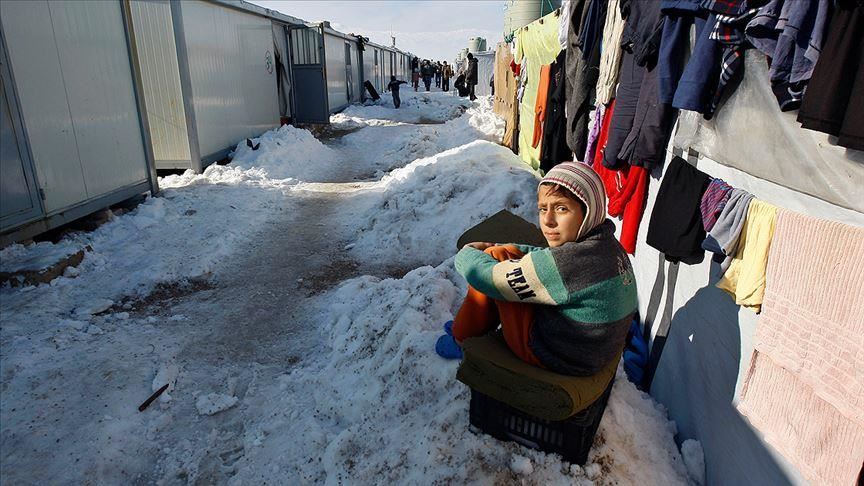By Sarah Tayara and Aimara Pujadas / GICJ
For almost 11 years, the people of Syria have been suffocated by brutal civil war and humanitarian violations. On Wednesday 26th and Thursday 27th January 2022, the Security Council held briefings on the humanitarian and political developments in the country. Geir O. Pedersen, Special Envoy for Syria, briefed on the political track, and Under-Secretary-General for Humanitarian Affairs, Martin Griffiths, explored the humanitarian situation. Civil society representatives were also present at both meetings.
Political Stagnation
Pedersen updated the Council on the bleak reality of the political situation in Syria. With no changes in the front lines of the conflict, he highlighted that the lack of military solution in the horizons. Combining this with the profound mistrust key states in the conflict, such as Turkey and Russia, harbour towards each other, the prospects of a brighter political future does not look promising.
Nonetheless, Pedersen explained his efforts to advance the democratic initiatives needed for states to commit to the reciprocal actions necessary to implement 2015 UN Security Council Resolution 2254, a resolution mandating the UN’s facilitation of a Syrian-led political process. Getting Germany, Iran, Qatar, Russia and Turkey to agree is but one of the struggles the Special Envoy has been battling with. Overcoming critical tension between the Syrian opposition and Russian delegation has been even more difficult, particularly during the 21st December 2021 Astana meetings in Nur-Sultan, Kazakhstan.
Moreover, Pedersen also addressed the reality Syrian Constitutional Committee, established following UNSCR 2254 on an agreement between the Syrian Government and the opposition Syrian Negotiations Commission, highlighting that there has been little effort from the parties to transform words into actions. Particularly, the Syrian government remains a considerable obstacle to advancing the process with discussions in Damascus.
Finally, Pedersen addressed the precarious situation of hundreds of thousands of Syrian civilians which remain subject to the political games of the various parties in the conflict. Particularly, he highlighted the recent Russian fighter jets bombing of several towns in northwest Syria’s, as well as Israel’s 28 December 202 airstrikes on Latakia, Syria’s main commercial port.
Humanitarian Plight
Addressing the humanitarian situation, Griffiths highlighted the stark humanitarian situation in the country. The economic turmoil, soaring food and fuel prices, uncontrollable spread of COVID, and rising unemployment rates have all led to an unimaginable poverty and hardship in the country.
Griffiths touched upon the recent developments regarding the delivery of humanitarian aid both across the border from Turkey into Syria, and crossline from Syrian government-held areas into areas outside government control. Griffiths highlighted that efforts to increase crossline humanitarian assistance must continue within Syria as an essential lifeline to millions of Syrians and the protection of thousands of humanitarian workers.
 Moreover, the unbearable living conditions have merely been exacerbated by the harsh winter. Camps for internally displaced people have been transformed into disaster zones, as stated by Mark Cutts, UN Deputy Regional Humanitarian Coordinator. Heavy snows and plummeting temperatures have led to over 9,000 tents housing more than 300,000 internally displaced Syrians to be damaged and destroyed according to the OCHA. Hardships have extended beyond Syrian borders, with the OCHA in Turkey reporting 362 tents have been damaged by the winter storms, affecting 2,124 Syrian refugees living in camps in the country.
Moreover, the unbearable living conditions have merely been exacerbated by the harsh winter. Camps for internally displaced people have been transformed into disaster zones, as stated by Mark Cutts, UN Deputy Regional Humanitarian Coordinator. Heavy snows and plummeting temperatures have led to over 9,000 tents housing more than 300,000 internally displaced Syrians to be damaged and destroyed according to the OCHA. Hardships have extended beyond Syrian borders, with the OCHA in Turkey reporting 362 tents have been damaged by the winter storms, affecting 2,124 Syrian refugees living in camps in the country.
Despite the efforts of humanitarian workers who have helped to clear the roads, deploy mobile clinics, repair or replace damaged tents, and provide items such as food, blankets, and winter clothing, three children have died as a result of the extreme weather and accidents provoked by the attempts to warm the tents with limited resources.
The lack of material conditions to face the severe weather conditions, and the use of hazardous materials to stay warm has meant preventable grave health and environmental impacts have now become the inevitable. Echoing Griffiths, Mr Cutts urged the international community to recognize the scale of the crisis and to quickly get the displaced out of tents and into safer and more dignified shelter.
GICJ position
Geneva International Centre for Justice (GICJ) remains deeply concerned by the political and humanitarian situation in Syria. More than a decade on from the beginning of the conflict, the needs of the people of Syria have yet to be genuinely considered, yet alone prioritised, by the Syrian government and other parties in the conflict. GICJ is particularly troubled by the conditions of children and the elderly. Incredibly vulnerable and faced with a lack of resources, they are the ones most struggling to survive.
GICJ calls upon all parties in the conflict to make a real commitment to putting the people of Syria first through mechanisms such as UNSCR 2254, as well as an immediate cessation of any military action against civilians. As the 11th year of the conflict encroaches, alleviating the suffering of Syrians should not be a secondary consideration but rather an imperative for the Syrian government and the international community.
Justice, Human Rights, Geneva, geneva4justice, GICJ, Geneva International Centre For Justice









